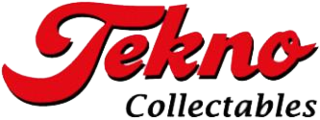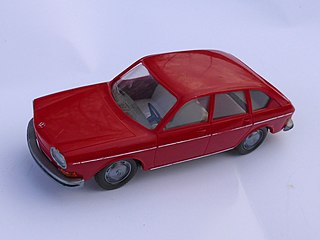
A die-cast toy is a toy or a collectible model produced by using the die-casting method of putting molten lead, zinc alloy or plastic in a mold to produce a particular shape. Such toys are made of metal, with plastic, rubber, glass, or other machined metal parts. Wholly plastic toys are made by a similar process of injection molding, but the two methods are distinct because of the properties of the materials.

Maisto is a brand of scale model vehicles introduced in 1990 and owned by May Cheong Group, a Chinese company founded in 1967 in Hong Kong by brothers P.Y. Ngan and Y.C Ngan. Head-quartered in Hong Kong, the brand has its offices in the United States, France and China. MCG also owns other model car brands such as former Italian brand Bburago and Polistil.

Sieper Lüdenscheid GmbH & Co. KG, mostly known by its trade name Siku, is a German manufacturer of scale models headquartered in Lüdenscheid. Some of the products sold by Siku are model cars, figurines, model aircraft, model commercial vehicles, and model agricultural machinery. Traditionally, production was centered in Lüdenscheid, but diecast models are now made in China, the Philippines, Taiwan and Vietnam.
Lone Star Products Ltd. was the brand name used by the British company Die Cast Machine Tools Ltd (DCMT) for its toy products. DCMT was based in Welham Green, Hertfordshire, north of London.

Majorette is a French toy manufacturer which mostly produces small Die-cast scale model cars, commercial vehicles, aircraft, and other vehicles, particularly in 1:64 scale. This is a normal 2.5–3 in (64–76 mm) size, thus Majorette has sometimes been called "the Matchbox of France". Traditionally, production was centered in the urban area of Lyon, but diecast models are now made in China, the Philippines, Taiwan, Thailand and Vietnam.

Tomica is a line of die-cast toy vehicles produced since 1970 by Takara Tomy Co. of Japan. Ostensibly, Tomica diecast were an outgrowth of Tomica World, an autonomous toy line of motorized train accessories that Tomy had created based on Plarail and produced since 1959. Similar in concept, Tomica can be thought of as the "Japanese Matchbox", but focuses mainly on Japanese brands.
Husky was a brand name for a line of business die-cast toy scale model vehicles manufactured by Mettoy Playcraft Ltd. of Swansea, Wales, which also made the larger Corgi Toys. Husky Models was re-branded "Corgi Junior" in 1970, and a further range called "Corgi Rockets" was developed to race on track sets.

Tekno is a Danish manufacturing company of scale model trucks and other vehicles, currently headquartered in De Lier, Netherlands. Originally established and based in Copenhagen, Tekno began manufacturing construction toys in 1928 and model vehicles immediately after World War II, selling 1 million a year during its peak.

Tootsietoy is a manufacturer of die cast toy cars and other toy vehicles which was originally based in Chicago, Illinois. Though the Tootsietoy name has been used since the 1920s, the company's origins date from about 1890. An enduring marque, toys with the Tootsietoy name were consistently popular from the 1930s through the 1990s.

Solido is a French manufacturing company which produces die-cast scale models of cars, military vehicles, and commercial vehicles. Vehicles are usually made of a zamac alloy in varying scales.

Norev is a French manufacturer of die-cast scale model cars. Traditionally based in Villeurbanne, a suburb of Lyon. It has normally produced modern and vintage European vehicles, especially those of French origin – though Italian, German, British, and American vehicles were also produced. Norev's closest competition was Solido, but that company had more pan-European influence, while Norev was more national in orientation.

Polistil S.p.A. is an Italian toy brand and former manufacturing company headquartered in Milan, with production center in Chiari, near Brescia. Polistil specialized in die-cast and plastic scale model vehicles of all sizes.

Cursor Modell was a German company making models of antique and modern German vehicles. It is best known for its plastic replicas of vehicles mainly of the era 1880 to about 1920, produced for, and sold in, the Daimler-Benz museum in Stuttgart.

Kaden Nachod is the somewhat anglicized name for the Kovodružstvo Náchod toy factory in the town of Nový Hrádek in the Czech Republic. The factory, however, started making toys about 1950 when the country was still communist united Czechoslovakia.
Holand Oto is a Dutch manufacturing company based in Weert that produces diecast scale model cars and trucks. The company was established in 1959 in Heerlen as "Bestbox", then changing its name to "Efsi" in early 1970s.

Sablon was a Belgian company near Brussels that made diecast zamac toy cars in the late 1960s and early 1970s. Models were mostly in 1:43 scale and were similar in concept to Dinky Toys or Solido.
Société Anonyme de Fabrication d'Injection et de Recherches was a French manufacturing company that produced diecast metal classic veteran and contemporary plastic race cars and other vehicles in the 1960s through the 1970s. It arose out of the previous French toymaker, "Jadali".

Morris & Stone, Ltd., which later changed its name to the more well-known Budgie Toys, was a British die-cast toy distributor turned manufacturer, based in London. The company first specialised in horse-drawn carriages and coaches. It later made a wide variety of miniature cars and trucks.
Gamda Koor, also known as Sabra was an Israeli diecast toy company that specialized in 1:43 scale cars. Most of these seem to have been original offerings, not seen elsewhere and not secondary tooling. The toy company Cragstan marketed Gamda Sabras as "Detroit Sr." for the American Market.















